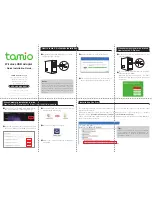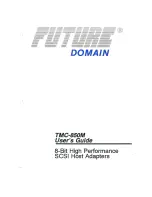
DC-395 Series User’s Manual
5
5
1. INTRODUCTION
The DC-395 series is a SCSI (Small Computer System Interface) bus to PCI bus host adapter,
which complies to the PCI 2.1 specification with Plug-&-Play (PnP) readiness. By using the
Disconnect/Reconnect technique, performance degradation during multitasking operations is
prevented. Other enhanced SCSI-2 features such as scatter-gather and command-tag queuing
are supported. The DC-395 series supports
ASPI
(Advanced SCSI Programming Interface)
managers for the following operating systems to assure operation with popular third party
applications:
•
MS-DOS
•
Windows 95/98/NT
•
OS/2 2.0/WARP 3.0/4.0
•
NetWare 3.x/4.x
Device drivers
are also supported for the following major operating systems for
compatibility with a full range of SCSI peripherals including CD-ROMs, Photo CDs, tape
backups, scanners, removable media and SCSI hard drives:
•
MS-DOS
•
Windows NT 3.x/4.0/2000
•
OS/2 2.0/WARP 3.0/4.0
•
Windows 95/98
•
SCO Unix 3.2v4.x & OpenServer 5.0.x
•
NetWare 3.x/4.x/5.0
•
UnixWare 1.1/2.1.3/7.0.1
•
Linux
•
Solaris 2.6/7.0
•
FreeBSD
* UnixWare, SlackWare/RedHat Linux, and FreeBSD drivers can be accessed via
www.tekram.com or ftp.tekram.com/scsi.
Most SCSI Adapters require device drivers to support more than 2 hard drives under DOS.
The DC-395 series, however, provides special support to handle up to eight devices,
including fixed disks and removable media under MS-DOS 5.0/6.x,
without
the need for
device drivers (
More than 2 drives support
).
The
on-board menu-driven setup
and
jumperless
design of the DC-395 series allow you to
configure the host adapter, SCSI devices, and BIOS-related parameters without opening your
computer. The DC-395 series also provides a utility program that supports low-level
formatting. And with the help of the DOS driver installation software (INSTALL.EXE), the
drivers are easily installed and the CONFIG.SYS and AUTOEXEC.BAT files are
automatically updated.
The fully intelligent solution provided by the DC-395 PCI to SCSI Host Kit is ideal for
multitasking environments such as OS/2, NetWare, Unix, Microsoft Windows 95/98 and
Windows NT, as well as next generation operating systems such as Microsoft Windows NT
5.0.






































